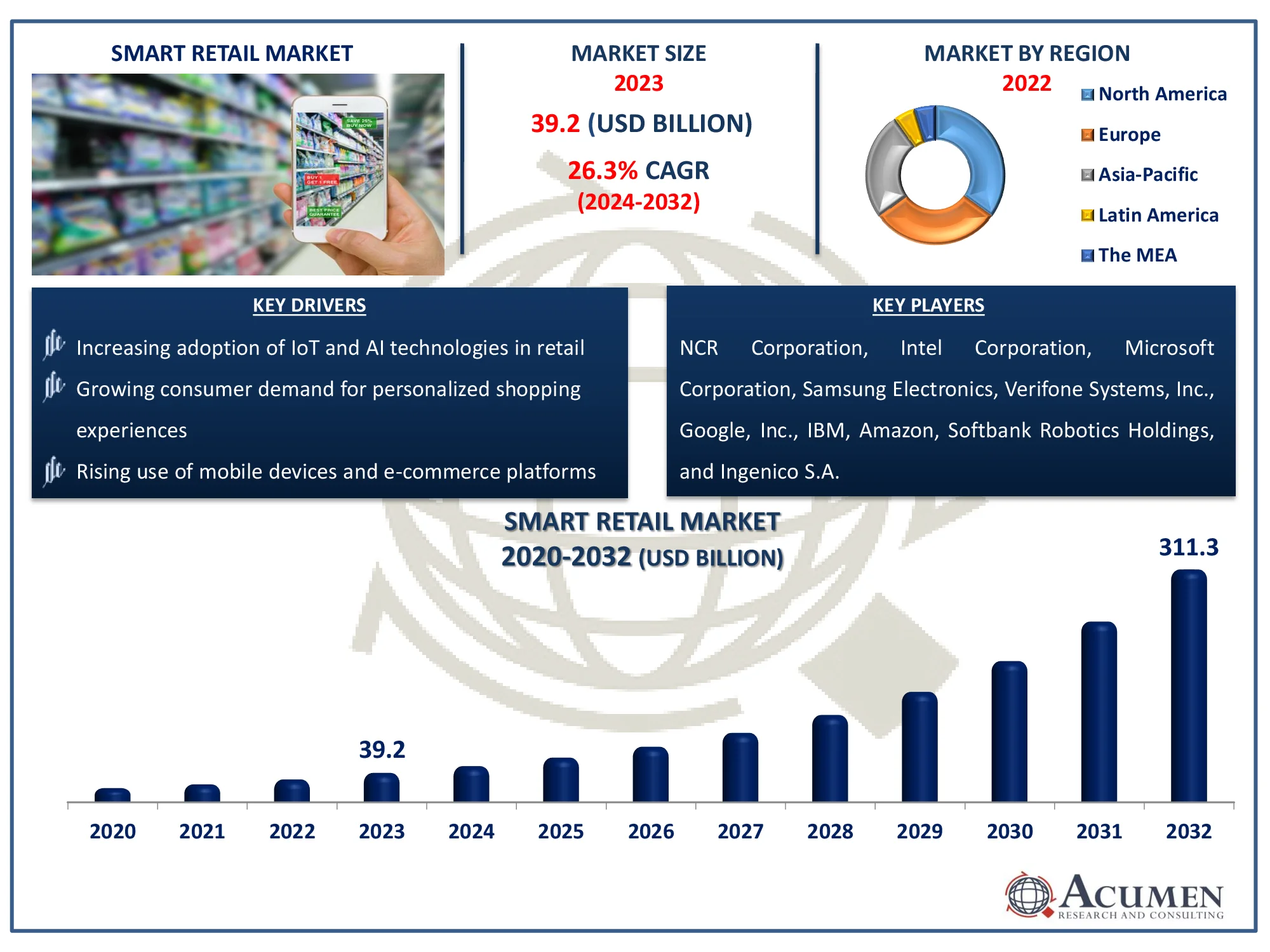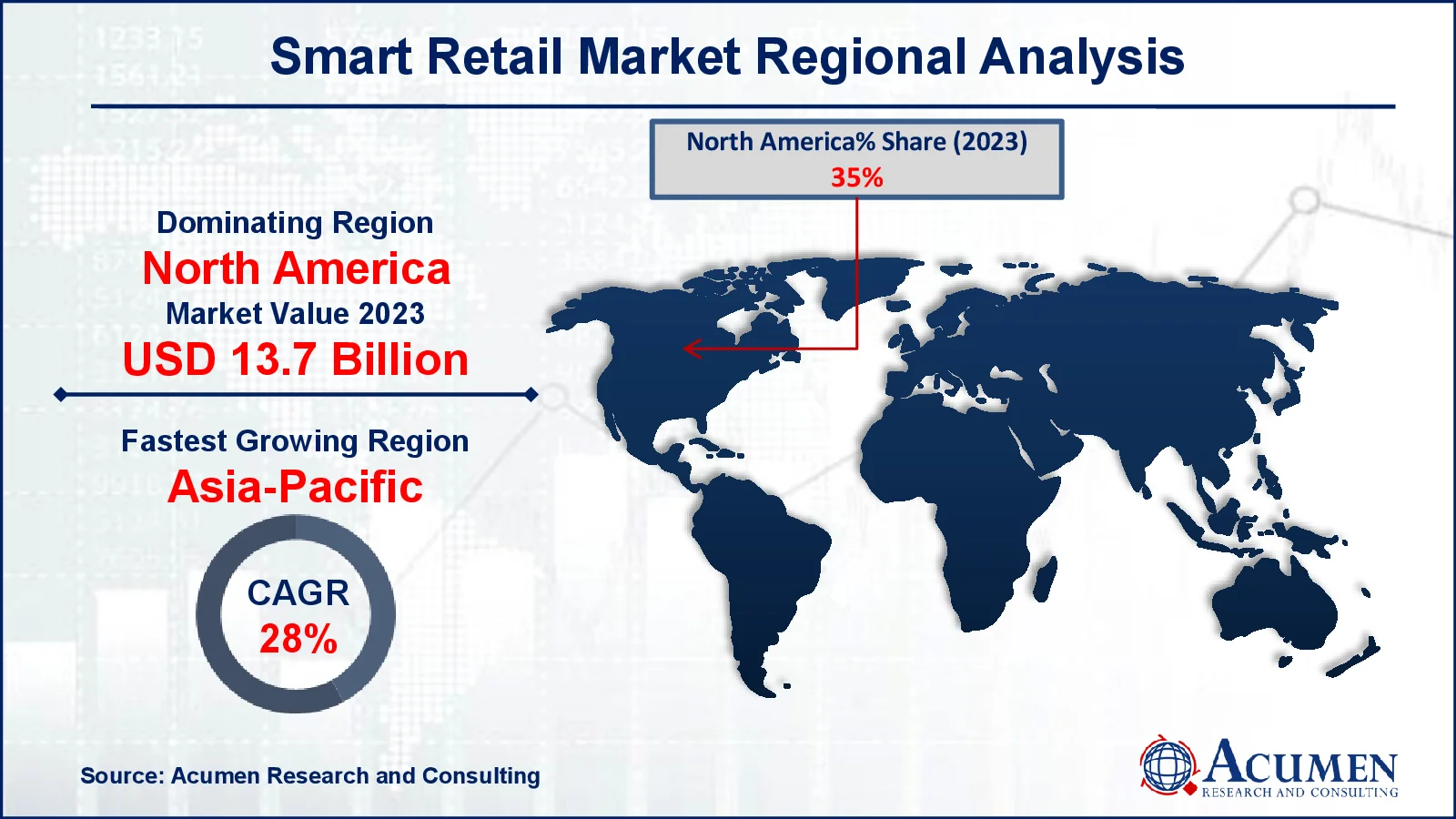Smart Retail Market Size - Global Industry, Share, Analysis, Trends and Forecast 2024 - 2032
Published :
Report ID:
Pages :
Format :
Smart Retail Market Size - Global Industry, Share, Analysis, Trends and Forecast 2024 - 2032
Report Coverage
- Industry Dynamics
- Market Size and Forecast Data
- Segment Analysis
- Competitive Landscape
- Regional Analysis with a Niche Focus on Country-Level Data
- High Level Analysis - Porter's, PESTEL, Value Chain, etc.
- Company Profiles of Key Players
- Option to Customize the Report As Per Your Specific Need
Request Sample Report
The Global Smart Retail Market Size accounted for USD 39.2 Billion in 2023 and is estimated to achieve a market size of USD 311.3 Billion by 2032 growing at a CAGR of 26.3% from 2024 to 2032.
Smart Retail Market Highlights
- Global smart retail market revenue is poised to garner USD 311.3 billion by 2032 with a CAGR of 26.3% from 2024 to 2032
- North America smart retail market value occupied around USD 13.72 billion in 2023
- Asia-Pacific smart retail market growth will record a CAGR of more than 28% from 2024 to 2032
- Based on solution, the hardware sub-segment generated 65% market share in 2023
- Based on application, the visual marketing sub-segment shows 28% growth in 2023
- Expansion of contactless payment and checkout solutions is the smart retail market trend that fuels the industry demand

Smart retail refers to the integration of advanced technologies like artificial intelligence (AI), the internet of things (IoT), augmented reality (AR), and big data analytics into traditional retail operations to enhance the shopping experience. These technologies enable personalized customer experiences, streamlined inventory management, and efficient supply chain operations. Applications include AI-driven chatbots for customer service, IoT-enabled smart shelves that track inventory in real-time, AR for virtual try-ons, and data analytics for targeted marketing. Smart retail also incorporates contactless payment systems and automated checkouts to reduce wait times. The goal is to create a seamless, convenient, and engaging shopping environment that meets modern consumer expectations.
Global Smart Retail Market Dynamics
Market Drivers
- Increasing adoption of IoT and AI technologies in retail
- Growing consumer demand for personalized shopping experiences
- Rising use of mobile devices and e-commerce platforms
Market Restraints
- High initial investment costs for smart retail solutions
- Data privacy and security concerns among consumers
- Limited technical expertise and infrastructure in some regions
Market Opportunities
- Expansion of 5G networks enhancing connectivity and real-time data processing
- Development of innovative customer engagement tools and AR/VR technologies
- Growing trend towards omnichannel retail strategies integrating online and offline experiences
Smart Retail Market Report Coverage
| Market | Smart Retail Market |
| Smart Retail Market Size 2022 |
USD 39.2 Billion |
| Smart Retail Market Forecast 2032 | USD 311.3 Billion |
| Smart Retail Market CAGR During 2023 - 2032 | 26.3% |
| Smart Retail Market Analysis Period | 2020 - 2032 |
| Smart Retail Market Base Year |
2022 |
| Smart Retail Market Forecast Data | 2023 - 2032 |
| Segments Covered | By Solution, By Application, And By Geography |
| Regional Scope | North America, Europe, Asia Pacific, Latin America, and Middle East & Africa |
| Key Companies Profiled | NCR Corporation, Intel Corporation, Microsoft Corporation, Samsung Electronics, Google, Inc., IBM, Amazon, Softbank Robotics Holdings, Verifone Systems, Inc and Ingenico S.A. |
| Report Coverage |
Market Trends, Drivers, Restraints, Competitive Analysis, Player Profiling, Covid-19 Analysis, Regulation Analysis |
Smart Retail Market Insights
The smart retail market is experiencing significant growth due to the increasing use of mobile devices and e-commerce platforms. For instance, according to Invest India, the future of e-commerce in India looks bright, with expectations of an annual growth rate of 18% until 2025. By 2030, India is projected to become the world's third-largest consumer market, highlighting the significant opportunities and potential within the country's e-commerce sector. Consumers are now able to access a wide variety of products and services on-the-go, driving demand for more personalized and efficient shopping experiences. Retailers are leveraging advanced technologies like AI, IoT, and data analytics to enhance customer engagement and streamline operations. This shift is transforming traditional retail models, making them more adaptive to the digital age.
Data privacy and security concerns have become significant restraints in the smart retail market as consumers grow increasingly wary of how their personal information is collected and used. High-profile data breaches and misuse of customer data have heightened these fears, leading to a lack of trust in smart retail technologies. This reluctance to share personal information can hinder the adoption of innovative retail solutions. Consequently, retailers must invest heavily in robust security measures and transparent data practices to alleviate these concerns and foster consumer confidence.
The expansion of 5G networks significantly enhances connectivity and real-time data processing, creating a transformative opportunity for the smart retail market. For instance, according to 5G Americas and data from Omdia, in 2023, the number of people using 5G technology around the world grew quickly. By the end of the year, there were 1.76 billion 5G connections globally, which was an increase of 700 million new connections compared to the beginning of the year. With faster and more reliable internet, retailers can implement advanced technologies such as AI, IoT, and augmented reality to personalize shopping experiences, streamline operations, and improve inventory management. This connectivity also enables real-time customer insights and seamless omnichannel integration, driving efficiency and customer satisfaction. Consequently, the smart retail market is poised for substantial growth, capitalizing on the robust infrastructure and capabilities provided by 5G technology.
Smart Retail Market Segmentation
The worldwide market for smart retail is split based on solution, application, and geography.
Smart Retail Solutions
- Hardware
- Software
According to the smart retail industry analysis, the hardware solution segment dominates the smart retail market due to its critical role in enhancing customer experience and operational efficiency. This segment includes essential technologies such as sensors, smart shelves, and self-checkout systems, which streamline inventory management and customer interactions. The increasing demand for automation and real-time data analytics drives the adoption of these hardware solutions. As retailers focus on improving in-store experiences and reducing costs, the prominence of hardware solutions in the smart retail market continues to grow.
Smart Retail Applications
- Visual Marketing
- Digital Signage
- Smart Label
- Smart Beacon
- Smart Shelf
- Smart Payment System
- E - Payment System
- Mobile Payment Application
- POS System
- Intelligent System
- Augment Reality
- Virtual Reality
- Smart Carts
- Interactive Kiosk
- Others
- Others (Robotics, Analytics)
According to the smart retail industry analysis, visual marketing plays a crucial role in the smart retail market by enhancing customer engagement and driving sales through eye-catching displays and interactive digital signage. Advanced technologies like augmented reality and artificial intelligence are used to create personalized shopping experiences that attract and retain customers. This approach not only improves brand visibility but also provides valuable data insights for retailers to optimize their strategies. As a result, visual marketing has become a dominant force in transforming traditional retail into a more dynamic and customer-centric industry.
Smart Retail Market Regional Outlook
North America
- U.S.
- Canada
Europe
- U.K.
- Germany
- France
- Spain
- Rest of Europe
Asia-Pacific
- India
- Japan
- China
- Australia
- South Korea
- Rest of Asia-Pacific
Latin America
- Brazil
- Mexico
- Rest of Latin America
The Middle East & Africa
- South Africa
- GCC Countries
- Rest of the Middle East & Africa (ME&A)

Smart Retail Market Regional Analysis
For several reasons, North America dominates the smart retail market due to its advanced technological infrastructure and high adoption rates of innovative retail solutions. For instance, in March 2024, Associated Wholesale Grocers and Instacart broadened their collaboration to provide e-commerce solutions and AI-enhanced smart carts, known as Caper Carts, to additional AWG-member retailers. Major retailers in the region are investing heavily in smart technologies like IoT, AI, and big data analytics to enhance customer experiences and streamline operations. The presence of tech giants and startups also fosters rapid innovation and implementation of smart retail solutions. Additionally, high consumer demand for personalized shopping experiences drives the market's growth in North America.
The Asia-Pacific region is the fastest-growing market for smart retail, driven by rapid urbanization, increasing internet penetration, and rising consumer demand for advanced retail technologies. For instance, according to China Organization, by June 2023, China had 1.079 billion internet users, up by 11.09 million from December 2022, reflecting ongoing growth in digital infrastructure and internet applications. Countries like China, Japan, and South Korea are leading the adoption of AI, IoT, and data analytics to enhance customer experience and operational efficiency. Government initiatives and substantial investments in digital infrastructure further accelerate this growth.
Smart Retail Market Players
Some of the top smart retail companies offered in our report include NCR Corporation, Intel Corporation, Microsoft Corporation, Samsung Electronics, Google, Inc., IBM, Amazon, Softbank Robotics Holdings, Verifone Systems, Inc and Ingenico S.A.
Frequently Asked Questions
How big is the smart retail market?
The smart retail market size was valued at USD 39.2 billion in 2023.
What is the CAGR of the global smart retail market from 2024 to 2032?
The CAGR of smart retail is 26.3% during the analysis period of 2024 to 2032.
Which are the key players in the smart retail market?
The key players operating in the global market are including NCR Corporation, Intel Corporation, Microsoft Corporation, Samsung Electronics, Google, Inc., IBM, Amazon, Softbank Robotics Holdings, Verifone Systems, Inc and Ingenico S.A.
Which region dominated the global smart retail market share?
North America held the dominating position in smart retail industry during the analysis period of 2024 to 2032.
Which region registered fastest CAGR from 2024 to 2032?
Asia-Pacific region exhibited fastest growing CAGR for market of smart retail during the analysis period of 2024 to 2032.
What are the current trends and dynamics in the global smart retail industry?
The current trends and dynamics in the smart retail industry include increasing adoption of IoT and AI technologies in retail, growing consumer demand for personalized shopping experiences, and rising use of mobile devices and e-commerce platforms
Which solution held the maximum share in 2023?
The hardware expected to hold the maximum share of the smart retail industry.



